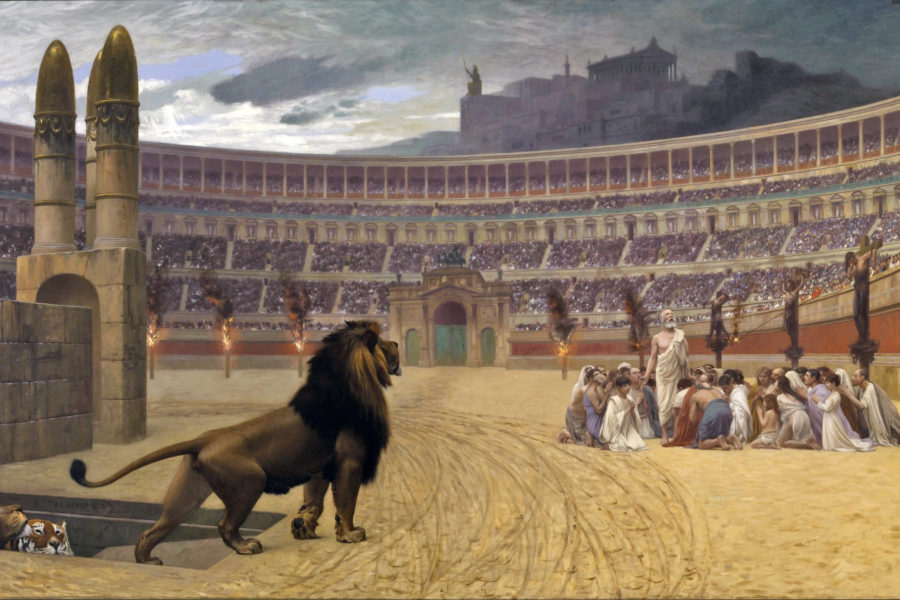Is there anything beyond the grave?
In John 14:3 Jesus said to his troubled disciples: “And if I go and prepare a place for you, I will come again and I will take you to myself, that where I am you may be also” (ESV). These words have afforded untold comfort to innumerable believers through two millennia. The questions we’d like answers for are these: Where was he going? And what kind of place was Jesus referring to? And do we really know there is such a place?
Is there anything beyond the grave? We know what materialists would say. Hardly anyone could have said it better than the late Stephen Hawking speaking to the UK’s Guardian newspaper: “I regard the brain as a computer which will stop working when its components fail. There is no heaven or afterlife for broken down computers; that is a fairy story for people afraid of the dark”. At least two ingredients of the materialist position are displayed here: the belief that the human being is nothing more than neurons and chemicals, and the idea (originating in 19th century Germany) that Christianity is nothing but wish-fulfillment.
The denial of an afterlife for human beings basically rests on two premises. First the denial of the soul, or of man as a profoundly spiritual being. Secondly, the conviction that the Biblical notion of heaven and hell are nothing but a cosmic bribe. Preaching about heaven and hell says Richard Dawkins, is all about psychological persuasion. It caused great psychological anguish in the middle ages and continues to do so today.
There are however two other deeper lying reasons for the skepticism about the afterlife since the dawn of the Enlightenment in the 18th century. The first has to do with the supposed cosmology of the Biblical story and the second with the sort of places heaven and hell are supposed to be. With regards to the first we may note that a cursory reading of Scripture makes it look as if the cosmos is divided into three stories or layers: the earth which is depicted as a flat slab resting on giant pillars; heaven as the abode of God, his angels and all the saints, which is located up and beyond the blue canopy covering our sky; and hell, which is somewhere below, under the earth. Heaven would then be located somewhere above the sky. But we all know today what lies beyond our atmosphere… space!
The second has to do with the depiction of heaven and hell. Medieval images of Judgment Day, spanning from Dante’s Inferno to Michelangelo frescos in the Vatican, have been etched in the Western consciousness through countless sermons, jokes, books, plays, hymns, songs, and artwork. It is these images that have provoked a lot of scorn from scientific humanism, as they portray hell as sensationally gruesome on the one hand and heaven as terribly boring on the other. Critics of Christianity seldom make a distinction between Christian legends about the afterlife and Biblical truth.
All of this proves the importance of the questions asked above about the place Jesus was going to, to prepare. Where is it? And what is it like? Is scientific humanism reacting against a caricature or against Biblical reality? And do we have any other reason besides the Biblical testimony that there is such a place as “heaven”?
So where is heaven?
So where is it and what kind of a place is it? Are we going to float around with little wings playing harps for all eternity? Or are we going to stand around a huge white throne singing all the time? Or is heaven a place where our souls (whatever that is) will exist in a disembodied and impersonal state forever with other blessed souls, beholding God’s face in perfect harmony and bliss? Is heaven somewhere far away above the clouds in the blue sky?
That is unfortunately how heaven has been portrayed in much of Christian literature and worship for too long. This view of heaven has far more of Plato’s thought in it than of Scripture. And yet it dominated the eschatological vision of Christians for many centuries. I had many parishioners asking me over the years: “Shall we recognize each other in heaven?” Or “Will there be trees and flowers and animals in heaven?” Others again could only think of one thing: to see a loved-one again on the other side. It is not hard to see therefore why even Christian cancer patients in their eighties sometimes rarely long for heaven and only start talking about it with any degree of delight when they are really facing its very portals. But this, one has to say, has been the case in our affluent Christianity in the West, where many Christians have only a cursory and superficial understanding of Scripture, while cute little angels decorate their fireplaces.
The whole picture changes radically when you listen to believers in poorer countries or wherever they face persecution. There the acquaintance with Scripture is often at a deeper and more existential level. Then age, gender or health makes no difference, and they long for something real and with great passion, i.e. to be with Christ. For these folks to be “in heaven” is to be with their risen Lord (cf. Phil. 1:21-23 and II Cor. 5:6-8). That is what makes heaven such a wonderful place. Jesus will be there! Anything less than that would be a reminder of hell. Thankfully recent Christian literature has begun to put the record straight on the life to come. One thinks of the influential work of UK scholar Tom Wright in Surprised by Hope (2008) and After You Believe (2010), of the amazing Bible Project and its short video “Heaven and Earth”. Popular Christian writings also begin to reflect these views more and more.
God’s space and our space
So where is heaven? The Bible Project‘s “Heaven and Earth” tells the story like this: In Genesis 1 and 2 heaven (as God’s space) and earth (as man’s space) overlapped completely. Adam and Eve walked in a blessed unbroken fellowship with God. But sin came and brought a radical separation between the two spheres, as man and woman were banished from the garden. From then on God’s space and man’s space continued to exist separately. It no longer overlapped completely. Man’s space (on earth) was radically marred by sin and filled with pain and misery, even though many remnants and memories of our happy state before the fall prevailed. God’s space, on the other hand, is one of perfect peace and glory, where he is enthroned and served by myriads of angels and archangels.
But God’s space is not far away, it is right here, it is just another dimension of being, one which we cannot observe with our senses (most of the time). And yet, while heaven and earth are now separate, they do intersect in many ways and at many times. Think of the temple in the Old Testament, and even before that, Moses’ experience at the burning bush in the desert. Or think of the place where Jacob slept when he fled from his home, which he called Beth-El (house of God). Or think of Mount Sinai or the angel of God visiting a deflated Gideon on the threshing floor. Think of God’s many answers to David when he agonized in prayer, of the fire sent from heaven when Elijah cried out to God on Mount Carmel, to name but a few.
Jesus the Messiah, the Son of God… and us
In the fullness of time, heaven and earth intersected in the life and work of Jesus Christ like never before since the fall. It happened nowhere clearer than at his birth, at the open tomb, during Jesus’ appearance to his disciples and when the Holy Spirit was poured out on the Day of Pentecost. And at the cross, we see hell in its brutal reality when Jesus is forsaken by God (and man), especially as the Nazarene hangs there for three hours in utter dereliction, taking upon himself the just condemnation by God that was due for us. And that is the only reason why sinners like us may have eternal life, and receive access into God’s heavenly grace.
Heaven and earth continued to intersect as Jesus worked mighty things through his apostles. And it still does so every time a sinner is truly converted or a broken heart is touched by his power. Heaven intersects with earth when we wake up to sing God’s praises with thankful hearts at the dawn of a new day, when we meet with his people to hear His Word proclaimed, and of course when we behold God’s glory in his handiwork in nature with great awe.
That is why all these events leave such a profound impact on its earthly recipients, i.e. on those whose eyes God has opened for his power and glory. Saint Augustine wrote in his Confessions: “Your Word touched my heart and from that moment I began to love you. See how heaven and earth and all that they contain call me to love You!” It is hard for us – even for those who choose to resist his grace and claim to experience him nowhere – not to “retain an intimation of the prelapsarian state” in the words of Toronto psychology professor Jordan Peterson (in Twelve Rules for Life). He continues: “We remember so to speak. We remain eternally nostalgic for the innocence of childhood, the divine… and the untouched cathedral-like old-growth forest”.
God is not far away
So heaven is not far away, because God is not far away. In his famous speech on the Areopagus in Athens Paul told those gathered, including some Greek philosophers: “And he made from one man every nation of mankind to live on all the face of the earth…, that they should seek God, and perhaps feel their way toward him and find him. Yet he is actually not far from each one of us, for ‘in him, we live and move and have our being’… because he has fixed a day on which he will judge the world in righteousness by a man whom he has appointed, and of this, he has given assurance to all by raising him from the dead” (from Acts 17:26-31, ESV). And of course, when they heard this, some mocked (like today) and others believed.
And then – when Jesus appears on the clouds – heaven and earth will finally come together again. John says in the Apocalypse “Then I saw a new heaven and a new earth, and the first earth had passed away, and the sea was no more. And I saw the holy city, New Jerusalem, coming down out of heaven from God, prepared a bride for her husband. And I heard a loud voice from the throne saying: ‘Behold, the dwelling place of God is with man. He will dwell with them and they shall be his people. He will wipe away every tear from their eyes, and death shall be no more, neither shall there be morning, nor crying, nor pain anymore, for the former things have passed away” (Rev. 20:1-4)
All of this refers to God coming to dwell on this earth, and of this earth being completely and magnificently restored! One only has to read passages like Isaiah 11 or 35 or 65 to realize how earthly the Jewish expectation of the future glory was, images that were lavishly employed in John’s Apocalypse when the Messiah will finally rule upon the earth and his people with him. This is our hope of glory! This is the promise of heaven! Between now and then will only be a short waiting period in Christ’s presence, with all his saints, if we die before his appearance. That waiting experience (wonderful as it may be in Christ’s presence) is not the hope of glory yet, for which we all so passionately longed for. It is simply the place where all of us go to wait for the rest of His saints to arrive until the archangel sounds the trumpet of God (cf. I Thessalonians 4:13-18 & Hebrews 11:39-40). And so Paul encourage the Philippians “Our citizenship is in heaven, and from it we await a Saviour, the Lord Jesus Christ, who will transform our lowly body to be like his glorious body, by the power that enables him even to subject all things to himself” (Phil. 3:20-21 ESV).
The implications of this immense. It means among other things that true Christians are going to really care for this world and live like servants who wait on their master’s return. They know that all their deeds on earth (individually and collectively) will have great significance for eternity. Every sinner brought to Jesus, and every believer served here on earth, will be there with us forever, if we all hold on to the Gospel as we have received it from the Lord.
This is however not the “pearly gates” 85% of Americans believed in when they said according to a recent Gallup Poll that they still believed in heaven. This is reflected in the relative little care many Christians have shown for preserving our earth or for social justice over most of the 20th century till today. A Biblical perspective on “heaven” will change our priorities here on “earth” because it has nothing to do with an escape from our earthly bodies to go and live somewhere among the stars. Heaven is not a place somewhere in the blue sky where people go when they die, it is God’s space of righteousness, love, and peace that will soon fully become “our space” here again. Jesus has gone back to “God’s space” to prepare it for us. One day he will return to bring this age to an end, with it all its sin, injustice and suffering, to reign forever with us and for His Father. And then heaven will be on earth again, like in the beginning.
The end of materialism
In other words, there is another world, interwoven with our world, which is fully intelligible, completely real, and which human beings can now access through spiritual perception, that is through faith and prayer. The ancients believed in such a world.
Judean Christian tradition called it the spirit-world, a world that is not far away, but right here, and which is as real as our own world. For Plato, this other world was the only real world, and our own physical world only an inferior copy of it. But the Bible says both are real… for both were made by God. Sin brought separation between them, but Christ came to reconcile all things to God, that is all things in heaven and on earth, through the blood of His cross (cf. Col. 1:20).
For ages mankind believed in such a world, call it the “spiritual realm”, until the age of reason dawned on Europe around 200 plus years ago… Slowly but surely western intellectuals began to discard the idea of such a world. Under the sway of a materialist and secular-humanist mindset, we were told we could believe in nothing but what can be perceived with our senses or be tested in a laboratory. Some – like Immanuel Kant – still tried to hold on to the “spiritual realm” as the basis for our absolute moral values in this world, but eventually, the West fell prey to the idea that heaven was simply part of a primitive, pre-scientific age. It was deemed an outdated “pie in the sky” for weaklings who need crutches to pass through life.
Thankfully the hard-core materialism of Modernity has had its day. It is in decline. Faith in the supernatural spiritual world is gaining new ground in our so-called Post-Modern age, for good or for ill. And as far as Christianity is concerned it is back for the following reasons:
- The stubborn experience of believers: The stubborn truth is that the reality of the spiritual realm is often far more real than the reality of this passing age, for true Christian believers. This experience only heightens as they move closer to death through suffering or persecution, or when they experience severe affliction. Famous American scientist Dr. John Collins was so convinced of this as a palliative care doctor, comparing his Christian patients with others around them in their dying, that it moved him to abandon his agnosticism and become a believer himself.
- The stubborn testimony of Scripture: The Old, but especially the New Testament’s witness regarding the life to come, has been able to weather every storm of criticism throughout history, only to come out stronger and brighter still. So much so that TIME Magazine even took notice of the Bible’s hope for our world! (Time, April 16, 2012)
- The stubborn truth of Christ’s resurrection: The factual truth of this most crucial pillar for our belief in life to come has been established much firmer, philosophically and historically speaking than ever before. Scholarship of the last few decades has proven that Paul’s defense of the resurrection of Christ in I Corinthians 15 is virtually impenetrable and that the dating of the synoptic Gospels could be pushed much closer to Jesus’ life than what has believed a century ago.
- Surprising new discoveries in science: Immanuel Kant (1724 – 1804) wrote 250 years ago that our knowledge of reality is limited only to the phenomenon we can observe. There is an aspect of the cosmos that we have no empirical access to, which he called the noumenal realm. That led some scientific humanists after him (in their quest to get rid of Christianity) to reject the noumenal realm as non-existent. That brought upon us the rank materialism of today: namely that only the material world exists. What Kant actually meant was that that human science and reason have its limits. One of the most significant developments in 20th-century physics was the discovery of quantum physics. Scientists discovered that there is an aspect of reality which looks much different from the phenomenal world we observe around us. This quantum world operates by different laws, it is for example not subject to the law of causality. Though we should be careful to jump to conclusions theologically speaking, one thing seems certain to me and that is that the quantum world exists in another dimension from ours. That alone should make anyone think again who wants to toss the spiritual realm of the Bible out the window too soon. (For a wonderful treatment of the subject for laymen like us, see Anthony van den Beukel’s The Physicists and God, chapter 4 “The End of Objective Reality”)
- Surprising evidence from Near Death Experiences: It’s too early to derive concrete evidence from the ongoing research into NDE’s in America, since much of what people report, who have undergone an NDE, can possibly be the consequence of oxygen deprivation and trauma. There is, however, according to Christian apologist and expert on NDE’s, Dr. Gary Habermas, irrefutable scientific evidence that people who have been declared brain-dead by physicians have observed events and details during that period, which would only be possible if human consciousness has an existence beyond the life of the body. The one clear loser from the current research into NDE’s, says Habermas, are the materialists who deny the human consciousness.
Bonhoeffer, CS Lewis, and St Augustine on the reality of the “unseen realm”
Dietrich Bonhoeffer wrote in his last letter to his fiancée just before his execution: “I have often found that the quieter my surroundings, the more vividly I sense my connection with you all. It’s as if, in solitude, the soul develops organs of which we are hardly aware of in everyday life. So I haven’t for an instant felt lonely and forlorn. You yourself, my parents – all of you including my friends and students on active service – are my constant companions… I live in a great, unseen realm of whose real existence I’m in no doubt… So you mustn’t think I am unhappy. Anyway, what do happiness and unhappiness mean? They depend so little on circumstances, and so much more on what goes on inside of us. I am thankful every day to have you – you and all of you – and that makes me happy and cheerful.” (From his Letters and Papers from Prison)
Our longing for heaven or glory has nothing to do with wish-fulfillment. It has everything to do with reality. Or as CS Lewis put it: “Our life-long nostalgia, our longing to be reunited with something in the universe from which we now feel cut off, our desire to be on the inside of a door which we have always seen from the outside: this is no mere neurotic fancy, but the truest index of our real situation” (from The Weight of Glory).
How ironic that the secular press reported the following in the Canadian newsmagazine Maclean’s on March 14, 2016: “We’re safer, richer, healthier – and more miserable – than ever before”. And the root cause of that misery? Because life in Canada revolves around one big question: “How much do you actually make?” Materialism offers no comfort. It just can’t deliver on its promises.
What Canadians and all of us need, is the beatific vision St. Augustine’s in the tenth book of his Confessions when he asked: “But what do I love when I love you, my God? Not physical beauty. Not fading charm. Not the splendor of earthly light, so precious to our eyes. No the sweet melodies of harmony and song. Not the fragrance of flowers, perfumes, spices. Not manna or honey. Not a body we can embrace with physical delight. It is not these things I love when I love my God. And yet, when I love Him, I do love a light of a certain kind, and a voice, a perfume, a food, an embrace, but they, are of the kind that I love deep in my inner being, where my soul is bathed in light which no place can contain – where it listens to a voice that never fades away with time – where it breathes a fragrance that no gust of wind can carry away – where it tastes a food that never runs out by eating – where it clings to an embrace that does not dissolve through the fulfillment of desire. This is what I love when I love my God”.
And that is why Christ’s disciples were willing to pay the ultimate price through two millennia. “For if the dead are not raised, not even Christ has been raised. And if Christ has not been raised, your faith is futile and you are still in your sins. Then those also who have fallen asleep in Christ have perished” (I Cor. 15:16-18 ESV). But they have not perished… They are alive forever more, for death was swallowed up in His victory!
The song down here sung by Belgian artist Dana Winner beautifully echoes the universal nostalgia of all normal human beings for a better world. Jesus Christ alone can show us the way to that world… where he will be Lord of all.








